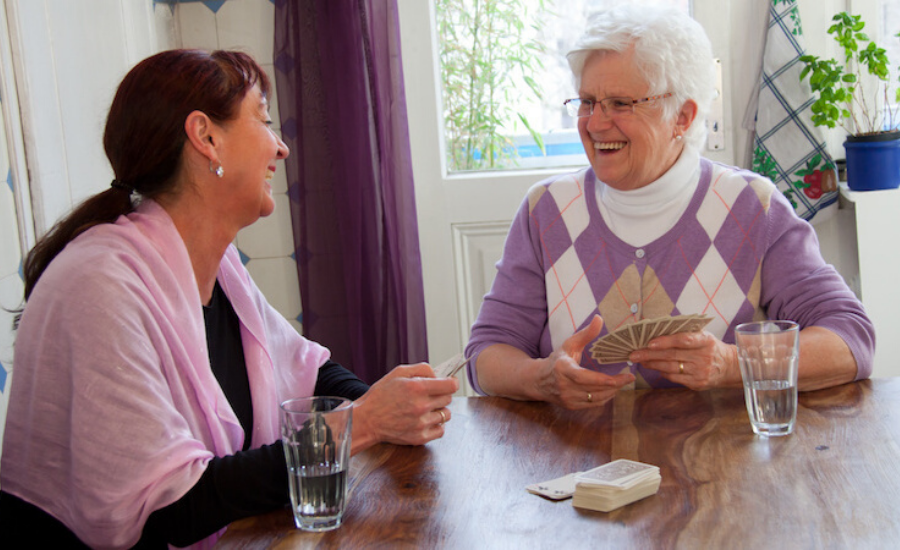We know that a diagnosis of dementia in any form, including Alzheimer’s disease, can bring up a lot of emotions, questions and concerns for you and your loved ones.
Dementia – Information and Resources for Patients and Caregivers
It’s natural and expected to be angry, sad and scared about the new reality you may be facing. You may even feel some relief or validation at the diagnosis. Whatever the case, know that you have made the right choice to seek assistance from your doctor, and we want to support you in this.
Along with the medical advice from your doctor, there are local and online resources that you may find helpful as you begin this journey. We have outlined some of the key details and suggestions below, including resource links for more detailed information.
Stages and Progression
The progression of symptoms associated with stages of Alzheimer’s disease are common among many forms of dementia:
Mild Cognitive Impairment (MCI) – may experience losing items more often, struggling to find the right words and feeling the effects of increased forgetfulness.
Mild Dementia – may experience memory loss and personality changes, getting lost and misplacing objects, having trouble with problem-solving and complex tasks, as well as having trouble organizing or expressing their thoughts.
Moderate Dementia – may experience increasing confusion and poor judgement, needing assistance with personal grooming tasks, significant personality and behavioural changes, and changes in sleep patterns.
Advanced Dementia – may experience the loss of ability to communicate, loss of physical capabilities, an increased susceptibility to infections, and require full-time daily assistance.
Someone diagnosed with dementia may progress through these stages at different rates than others, and may or may not experience all of the associated symptoms.
There is no known cure for most forms of dementia, however you can begin taking steps today to plan for your future and to help boost brain health and mental and emotional functioning.
Self-Care
We know how important self-care can be to any healthy lifestyle, so we’ve highlighted some dietary and activity suggestions specific to maintaining quality of life for those with dementia.
Healthy Eating – The MIND Diet
MIND stands for the Mediterranean-DASH Interventions for Neurodegenerative Delay, and combines elements of two popular healthy nutrition plans: The Mediterranean Diet and the DASH Diet.
10 foods to eat regularly to help reduce risk of dementia and decline in brain health:
| Type of Food | Servings |
| Green, leafy vegetables | 6 or more per week |
| All other vegetables | 1 or more per day |
| Berries | 2 or more per week |
| Nuts | 5 per week |
| Olive Oil | Use as main cooking oil |
| Whole grains | 3 per day |
| Fish | 1 or more per week |
| Poultry | 2 or more per week |
| Red or White Wine | Max of 1 glass per day |
Foods to avoid include butter, margarine, cheese, red meat, fried foods, pastries and sweets. Try to reduce consumption of most of these items to less than once per week
Positive Activities
8 things to do with your loved ones to encourage stress-free satisfaction:
- Talk about the past together. Look at old photo albums or listen to music while you reminisce
- Be artistic! Crafting, painting and scrapbooking are great ways to get creative
- Make a memory box and talk about the story behind each item or image
- Household tasks like setting the table and folding laundry
- Get physical! Walking, gardening, and swimming encourage light activity and a dose of fresh air
- Visit friends and family, call them on the phone or use video chat
- Play cards or do puzzles
- Sit down for a meal together. Even better – make the meal together!
For Caregivers of Loved Ones with Dementia
Through this journey of caring for your loved one through their diagnosis and progression of dementia, you deserve some self-care as well! It’s important to manage your stress and wellbeing.
Six suggestions to take care of yourself while caring for someone with dementia:
- Learn about dementia
- Be realistic about the disease and accept your feelings about your new journey
- Share your feelings with trusted others
- Look for the humour in your situation and embrace positive feelings
- Create a personal support network. Ask your friends, family, community centre or local dementia support organization for respite care. Respite care provides caregivers a temporary rest from caregiving. Taking time for yourself, even an hour or two, will help rejuvenate your mind and body
- Plan ahead for the immediate future and the long term
Tips for Communicating with someone who has dementia:
- Be patient, don’t interrupt
- Ask direct questions
- Use touch (on the hand or arm) to help them refocus
- Start the conversation, and make eye contact
- Acknowledge what they said and encourage them to elaborate
- Use photos, labels and calendars to help them identify and remember people, objects and dates
- When participating in activities together, try breaking the activity into smaller steps. Take breaks between activities and keep the time spent on each activity short.
Care Options
As dementia progresses to the later stages where more assistance is required, the following local services and support are available: Day Programs, Respite Care, In-Home Care, and Care Facilities.
The information provided above is for general information purposes only. If you have any questions regarding your health or the health of a loved one, please contact your doctor or healthcare provider.
Resources
The following resources provided valuable information for this article:
- Alberta Health Services Dementia Advice Line: 811
- http://www.dementianetworkcalgary.ca/
- https://dementiaresourcesalberta.info/
- https://www.alzheimercalgary.ca/
- https://www.dementiaconnections.ca/magazine/
- https://www.healthline.com/health/dementia/stages#stages
- https://www.healthline.com/nutrition/mind-diet
- https://www.dementiaconnections.ca/listings/
- https://alzheimer.ca/en/help-support/im-caring-person-living-dementia/providing-day-day-care/finding-suitable-activities
- https://www.dementiaconnections.ca/search?q=activities


